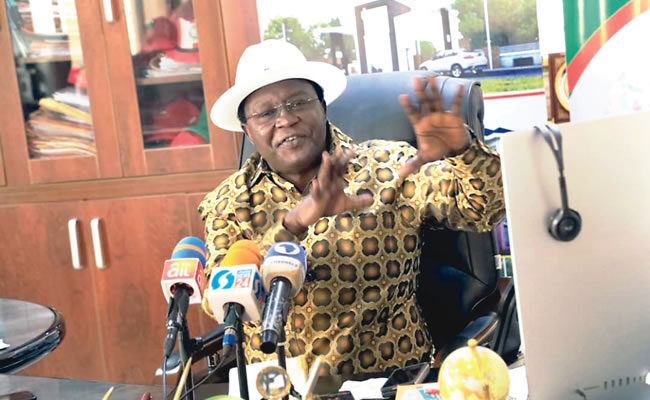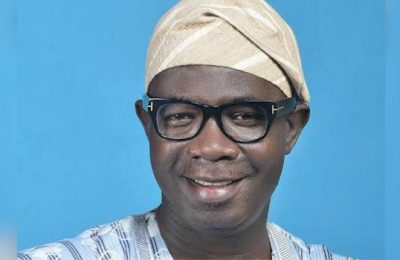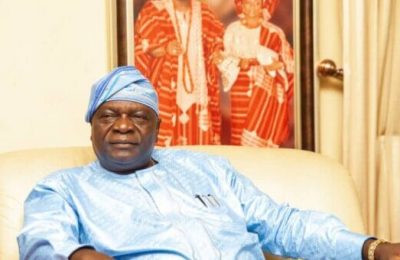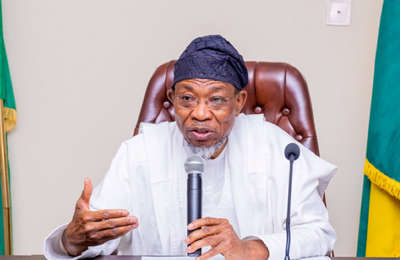After 35 years in various leadership positions in trade union service, the President of the Nigeria Labour Congress (NLC), Comrade Ayuba Wabba, will finish his eight-year tenure on February 8, 2023, as the Congress elects a new president that will pilot its affairs. As part of his preparation to hand over NLC leadership to the next president, Comrade Wabba spoke to journalists on some of the issues NLC will keep agitating for. CHRISTIAN APPOLOS brings excerpts.
Your tenure as NLC president is at its last lap. How would you describe your experiences in the Congress’ highest leadership position?

I started my trade union career in 1988 and I came from the student union movement. I was the President of the National Union of Health Technology Students as far back as 1988. So, if you look at it carefully from 1988 till date, it is almost 35 years. I have gone through 13 elections and by the special grace of God have not lost any; from the branch level to the state council level of NLC, to the national leadership of my union, Medical and Health Workers Union. I am so proud of that union today, because it is the leading union in Nigeria in terms of development and perspective.
From there, I actually came into NLC as treasurer for eight years. And I am serving out as president having served for eight years. I am currently a member of the governing body of the International Labor Organisation and I am also serving my second term at the ILO. I have just finished my term as the first African to lead the International Trade Union Confederation. It is a rare privilege to have gone through these processes in the service of trade union for 35 years.
My philosophy as a trade unionist has been guided by Mahatma Gandhi of India, who said that ‘for you to change your society, you have to be that change yourself.’ If you want a system to be transparent, you must fight corruption. You must be at the spot because if you are corrupt, you cannot fight corruption. That wisdom was what necessitated us to come with the philosophy of returning to our founding principle in 2015. The principle of speaking truth to power, whatever it takes.
So, it is an awesome experience to be a part of the struggle and group of people that fights for the rights of workers and Nigerians by extension.

Talking about fighting corruption, the fuel subsidy crisis in Nigeria still lingers. How do you think the issues can best be resolved?
I can say on the basis of the fact before Nigerians and all of us that the issue of the fuel subsidy has remained the same issue for the past 30 years. Every government that has come will make promises. But once they come into office, either because of a lot of incentives associated with importation or for obvious reasons, those promises have never been kept.
And there is no difference between 2015, now and what happened in the past. Since the adoption of the 2003 IMF recommendation that we should actually base our pricing model on the input driven model. We have not actually gotten out of that. And labour has engaged this issue from 1999 to date. In some cases, they will actually withdraw the price but after a while the price will still be the way it is.
None of us imagined that after all these years, we will wake up in 2023 with a very long queue, with people also having to buy this product at a very exorbitant price. I must repeat that these fuel subsidy issues are actually driven from outside this country by neoliberal forces. I remember the last engagement we had when we had to stop the issue of removal of the so-called subsidy and the meeting ended in a sine die till date. The first person that came to my office was the Ambassador of Belgium to Nigeria. He came and sat there. And he was inquiring; why do we want to stop importation? I told him we are the only OPEC member country that still imports 100 percent of petroleum products that we use. I said it is an irony.
Is refining rocket science that Nigerians cannot refine, what then is the issue? The issue is simple; few people benefit when you import, but when you refine, many people benefit. So, because of the inherent benefit in it when you refine, the few people that benefit when you import are not willing to address and stop this issue of importation.
It can be stopped if there is political will to do that. And I have made the point severally that we have done a lot of research. We have made several publications on this particular issue, but it will take a system that is willing to work for the citizen and make the citizen not suffer this inefficiency we suffer today in Nigeria for the system to be fixed.
We cannot always wish that the system be fixed. No, it can only be fixed if you have leaders that are ready to actually fix this problem. Removal of subsidy alone cannot fix the problem. We have seen that with diesel. We have seen that with kerosene. They said they have removed the so-called subsidy in diesel and kerosene, are diesel and kerosene available? Are they affordable? The obvious answer is no. So, by the time we say remove the subsidy on PMS, what it will entail is that it will be the same situation with diesel and then kerosene.
Diesel today in many local areas is sold at between N800 and N900 per litre. It is not affordable. As a major oil producing country is that acceptable? The obvious answer is no. And that’s why in the workers Charter of Demand, the first item there is for us to take any candidate seriously, he or she must tell us what they want to do with the issue of the refining. One said he will sell the refineries and another one said he will remove the subsidy.
If you remove the subsidy, what will we fall back on? Because the removal of subsidy is easy. If you are refining here at home, you don’t even need to preach that I want to remove subsidy. What Obasanjo did to give some succour to citizens was swap. They swap crude oil with refined products, because in a barrel of crude oil, you have more than 17 derivatives. So when you swap, you are sure that you give crude oil and then you receive refined product. That was how he mitigated the price and prevented the price from fluctuating the way it is fluctuating now.
As I speak, we are told that NNPC is the major importer. So, even the consumption rate, what we consume per day has become a mystery because nobody can tell you exactly how many litres of PMS we actually consume per day. These are part of the challenges that we have engaged.
We have not been able to find a solution despite the best actions that have been done from 1999 to date’. And that is why we made it a campaign issue that every worker must have his PVC. Let us listen to their conversation about this issue. Do we want to continue the same trajectory of importing products that we can refine and say we want to address the issue of subsidy? Subsidy can naturally be addressed. If we are refining products for domestic use.
Take for instance, the issue of diesel is eye-opening to the fact that our government is not sincere to us. The easiest product to refine is actually diesel. That is what many of those illegal refineries are refining. Why not organise them into clusters, empower them, build modular refineries and say for a start, can we stop the importation of diesel? I assure you that we will stop the importation of diesel. We would have addressed I think 50 percent of the challenge because many of our machineries, many of the trucks used depend on design, and therefore the cost of goods and services will even come down.
We have made it a major campaign issue. We want to listen to the candidates. On the eve of the NLC Delegates Conference which will take place on February 7 and 8, we have invited the four major candidates and Nigerians, especially workers, will hear them speak on the issue and decide who to vote for because we have lamented enough and it is time for action. This thing can be fixed. We have the best brains around the world that can fix this issue. But because of the interest of few, they have refused to fix this problem. Instead, we are lamenting.
I must also say categorically that even with the best of campaigns, you cannot change such a system we have in Nigeria except we have leaders that are ready to change the system. It is something that can be done. This one is the issue we have engaged over time and I can tell you that it has not been addressed. Therefore it is one of the issues that will continue to engage.
Recently, there were allegations against NLC concerning Good Homes Estate for civil servants, what is the verifiable truth about the issue?
Good Home Estate wasn’t a project of NLC and TUC. It was a Federal Government project initiated by the Federal Government, and President Goodluck Jonathan went to the site to do the commissioning. Two districts were allocated for this project. After the commissioning exercise, subscribers, about 300 of them, actually subscribed to the project and the project commenced.
But midway, the project stopped and the developer refused to proceed. When I came in, I invited them and we had a meeting here. We said let us work together because it is not even all workers that subscribed. So, I said to the current Minister of FCT, you didn’t start this project, but government is a continuum. So, I said please can you assist us in driving this process of this project and he said yes. So, we took up a day we went to the site, we saw the buildings that were available. We saw the development that was already there and the minister was so concerned and said he was going to follow up on the project. He said it is a viable project.
He came to the committee headed by the current Permanent Secretary. And things were going on until the developer lost his wife and he became destabilised. I also pitied him.
NLC is a fighting organisation. We fight for people’s rights. We protect people’s rights. That is the philosophy behind this organisation. So, despite the fact that I didn’t initiate it, I met it as a challenge and faced it squarely. Therefore, from what we have been able to do and the commitment the Minister of FCT gave me, that the two districts given to workers, they will have their land and their houses. And I think that is the most progressive thing we have done.
So, we are committed to seeing that the project is achieved. Where I stopped, the incoming leadership will continue. But we will not work with people that have a different vested interest different from the one that is in the larger interest of the subscribers. Therefore, it is good also for the media to ask anybody speaking on this issue, are you a subscriber or you are a worker? Because it has become a business where they will go to the ministers to protest and demand that the minister should give them their land. The minister will not do that. I will also advise the minister to ignore such people that will come for their individual interests.
We remain committed to making sure that every genuine subscriber will have to get his own house and we have gotten the FTC to be committed to that. We have the list of subscribers. The Minister of FCT has the list of subscribers and TUC also has the list of subscribers.
ALSO READ FROM NIGERIAN TRIBUNE







